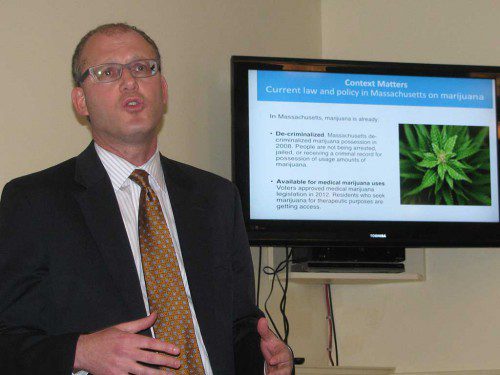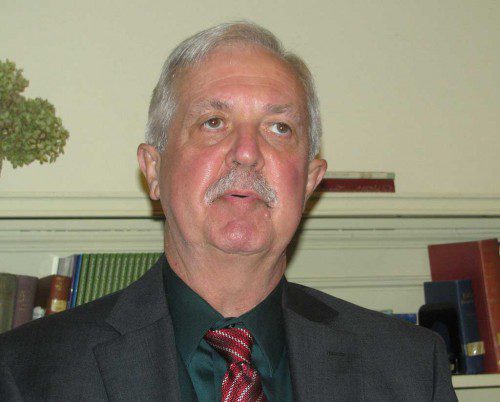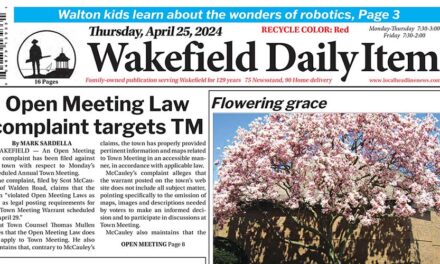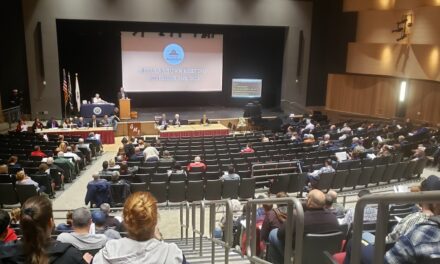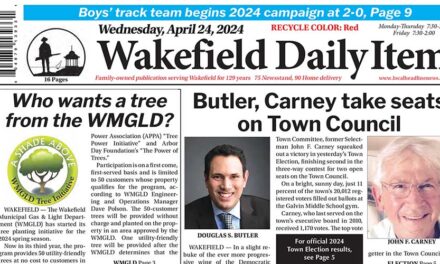Published in the October 19, 2016 edition
By MARK SARDELLA
MELROSE — Speakers at a forum held last night warned of the potential dire consequences if Question 4 on the Nov. 8 ballot passes, allowing the commercial marijuana industry into Massachusetts.
Several dozen area residents attended an educational program held in Melrose on Ballot Question 4, which will ask Massachusetts voters in the Nov. 8 Election to create a law that would legalize marijuana for recreational use and commercial sale.
The event was held at the First United Methodist Church and featured two speakers: Dr. Alan Woolf and State Senator Jason Lewis.
Dr. Woolf is director of the Environmental Medicine Program at Boston Children’s Hospital. He is also a professor of pediatrics at Harvard Medical School and board-certified medical toxicologist.
Sen. Lewis is chairman of the Massachusetts Senate Public Health Committee. He also chaired the bipartisan Senate Special Committee on Marijuana, which studied the issue of legalization for over a year. Sen. Lewis represents a district that includes Wakefield, Melrose, Stoneham, Malden, Reading and Winchester.
Dr. Woolf noted that in 2012 marijuana was roughly a $6 billion industry in the United States. By 2020, he said, it is expected to be a $44 billion industry.
“We now have a national marijuana industry association that’s representing their interests,” he said.
Dr. Woolf began his presentation by passing around a plastic container of lentils and asked each person in the audience to take one. A piece of the human brain the size of a lentil, he said, contains 30-40 million cells and about 500 billion synapses – the connections between nerve cells.
“That’s the complexity of the brain,” he said.
He noted that adolescents may look like adults and in some ways behave like adults but in fact they are still in the developmental phase of their lives. Brain development, he said, was once thought to be complete by about the age of 12. But now, he said, “We know that brain development continues well into your 20s.”
One of the last regions of the brain to fully develop is the pre-frontal cortex, Dr. Woolf said, which is important in cognitive functioning, including the weighing of risk.
He said that adolescents seek novelty and are looking to experiment. When it comes to substances, he said, they will start with what is most available, which is alcohol, tobacco and marijuana. Those drugs can serve as gateways to other drugs, he said.
When adolescents use marijuana, he noted, its effect is different than it would be on a mature adult brain. He said that adolescent use of marijuana has be associated with increased rates of learning disabilities, higher school dropout rates and increased rates of auto accidents.
The marijuana industry, he said, goes to great lengths to downplay the public health consequences of marijuana use in adolescents and adults.
Sen. Lewis talked about the work that the Special Senate Committee on Marijuana had done and the 112-page report of its findings that it issued. He said that he started out not knowing much about marijuana and maintained a neutral position throughout the study. But in the end, he concluded that that the law proposed under Question 4 would be very bad for Massachusetts.
He said that many voters think of it as a simple question of allowing someone to smoke a joint without being arrested. But in fact, he said, the proposed law would create a whole commercial marijuana industry in the state, leading to a host of public health issues.
Lewis shared a list of prominent individuals who are against legalization, like Gov. Charlie Baker, Attorney General Maura Healy and Boston mayor Marty Walsh. He also pointed to a list of leaders in the field of healthcare, business and law enforcement who have decided that Question 4 is bad for Massachusetts.
He noted that since Massachusetts decriminalized marijuana in 2012, virtually no one is arrested any more for possession or use of marijuana.
Ballot Question 4, he said, was authored by the “Marijuana Policy Project,” which is backed and largely controlled by the marijuana industry.
“This is big business,” he said, noting that basically the same question is on the Nov. 8 ballot in six other states. Four states have already legalized marijuana for recreational use.
Sen. Lewis talked about the much higher THC levels of today’s marijuana that that of the ‘60s, ‘70s and ‘80s. In addition, he said, the active ingredient is being extracted from marijuana and made available in almost pure form. The concentrated oil is also infused into high potency marijuana edibles.
He showed images of marijuana edibles packaged to look like existing products but having slightly altered names like “Pot-Tarts” or “Krondike Bars.” Such products pose a real danger to kids and pets, Lewis warned.
“This industry is really shameless,” he said.
Such products, Sen. Lewis said, are “very enticing to teens and young adults and are part of the industry’s effort to recast marijuana and normalize it. Marijuana is being repositioned by the industry as something cool, harmless and even healthy,” Lewis said, adding that edibles are a key part of that.
The state of Washington, Lewis said, saw marijuana involved highway fatalities double since the state legalized the drug.
Colorado now has more marijuana shops than Starbucks and McDonald’s combined, he noted, and the industry concentrates on low income, minority communities. Colorado now has a huge problem with a new black market where people allowed to grow marijuana for personal use are selling it illegally.
Colorado has the highest rate of teen marijuana use in the country, Lewis said. Legalization, he added, sends a message to teen that pot is safe, harmless and even healthy. He said that surveys in Massachusetts have shown that teens’ perception of risk from use of marijuana has been steadily falling since the 1990s.
The law proposed in Question 4 would place no limits on potency, no limit on the number of stores allowed and no limits on marijuana edibles, Lewis said. The law would also allow for mass marketing of marijuana and would limit a city or town’s ability to control the local presence of the marijuana industry.
Lewis disputed pot proponents’ claims that marijuana can be a substitute for opioids in pain management, saying that there is no scientific basis for the claim.
The argument that legalization will bring a windfall of tax revenue is “fool’s gold,” Lewis said, arguing that the rate at which marijuana sales would be taxed in Massachusetts under the law proposed in Question 4 is so low that it would not even pay the state’s cost of regulating the industry.
Lewis said that a major part of his objection to Question 4 involves allowing the commercial sale of marijuana.
“A company that has a profit motive is only going to increase demand,” he said.
Lewis said that voters have just one chance to stop the commercial marijuana industry from entering Massachusetts and that’s to vote “No” on Question 4.
“Once the genie is out of the bottle, the industry will fight tooth and nail to protect it,” he said. “The only chance we have is on Nov. 8.”

